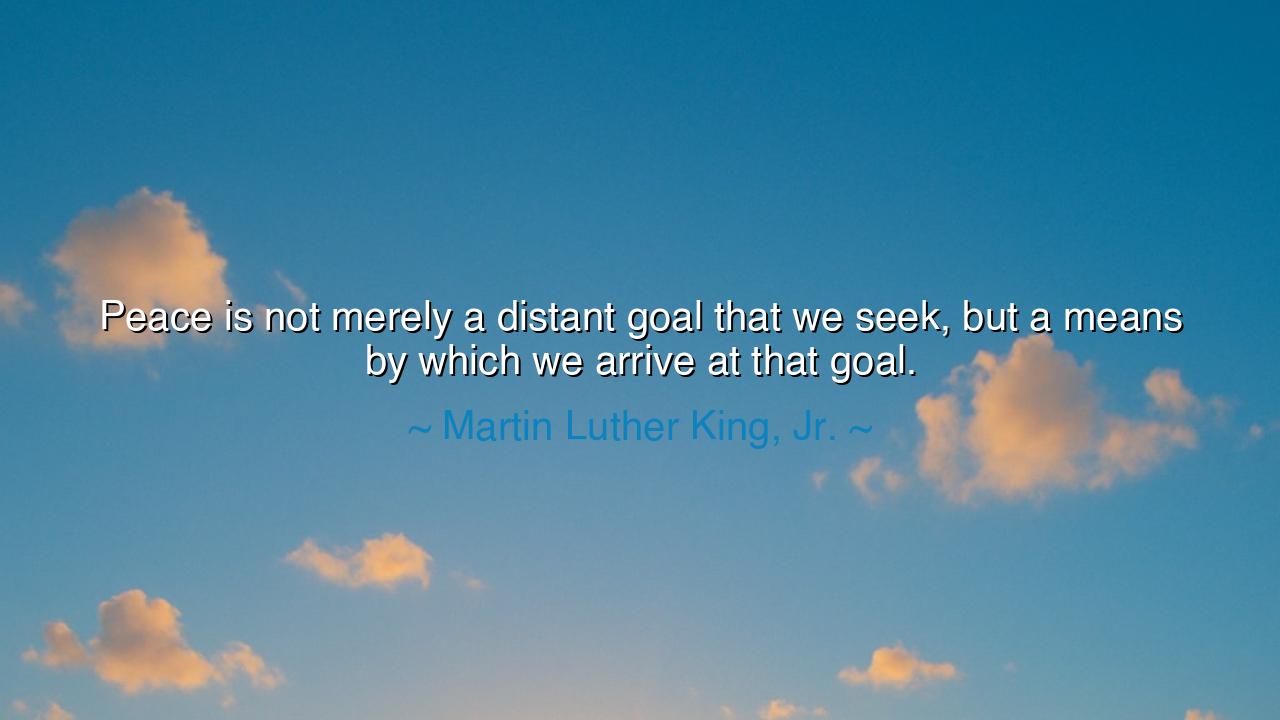
Peace is not merely a distant goal that we seek, but a means by
Peace is not merely a distant goal that we seek, but a means by which we arrive at that goal.






The words of Martin Luther King, Jr. — “Peace is not merely a distant goal that we seek, but a means by which we arrive at that goal.” — shine like a beacon in the storm of history. They carry the wisdom of a man who walked through fire, who endured hatred, who faced the shadow of violence, yet who steadfastly held that peace was not a prize to be seized at the end of battle, but a path that must be walked every step of the way. His words remind us that the spirit in which we strive is the spirit in which we will arrive. To sow violence and expect peace is folly; to plant injustice and hope for justice is madness. The path and the destination are of one cloth.
At the heart of this saying lies the truth that the means shape the end. If a man fights with cruelty, then even if he claims victory, he has already poisoned the fruit of his triumph. If a people rise in hatred, they will find only more hatred, even if their banner declares freedom. King, drawing from the well of Christ’s teaching and the philosophy of Gandhi, proclaimed that peace must be the weapon and the shield, for only peace can give birth to peace. He saw that the destiny of his people — and of all humanity — could not be secured by the very forces that had enslaved and degraded them.
History offers us both warnings and affirmations of this truth. The French Revolution sought liberty, equality, fraternity — yet it pursued them through terror, blood, and the guillotine. The result was not a republic of peace, but a season of fear and, soon after, the rise of tyranny. Contrast this with the movement of Gandhi in India: through marches, through fasting, through nonviolent resistance, millions confronted an empire without sword or gun. Though hardship abounded, their cause bore fruit, and independence was won without drowning the land in blood. These stories show us vividly: the path of peace leads to peace, the path of violence leads only to chains anew.
King himself embodied this principle in the crucible of the American Civil Rights Movement. When churches were bombed, when marchers were beaten, when dogs and fire hoses were unleashed, there were many who cried for vengeance. Yet King held fast: no matter the provocation, the movement must answer violence with dignity, hatred with love, oppression with peaceful defiance. The world watched, and the contrast was undeniable. The oppressors, clad in cruelty, stood shamed before the eyes of humanity, while the oppressed shone with moral strength. The means became the victory itself, for their peaceful stand revealed the justice of their cause.
There is in these words a lesson not only for nations but for every soul. For who among us does not seek peace? We dream of it in our families, in our communities, in our own restless hearts. Yet how often do we seek it with weapons of anger, with words of bitterness, with actions of division? King warns us that we cannot fight fire with fire. If we would have peace in our homes, we must walk in patience. If we would have peace in our hearts, we must live with forgiveness. If we would have peace in the world, we must choose daily the way of gentleness, courage, and truth.
The lesson for the generations is clear: the goal cannot be separated from the means. If you would arrive at peace, walk in peace. If you would see justice, act with justice. If you would build love, sow it in every word and deed. Do not deceive yourself that you can tread one path and end in another. The fruit is always of the seed, and the harvest is always of the planting.
In practice, let each listener take steps toward this wisdom. In conflict, pause before you strike in anger, and seek instead a path of peace. In striving for change, refuse to imitate the cruelty of those you oppose. In your personal ambitions, pursue not only the goal, but the spirit in which you travel toward it. For every step shapes the journey, and the journey shapes the destination.
Thus Martin Luther King, Jr.’s words remain for us as a timeless law: “Peace is not merely a distant goal that we seek, but a means by which we arrive at that goal.” They call us to live now the very future we desire, to make of every action a reflection of the world we wish to see. For the path is not separate from the destination: the path is the destination. And in walking the way of peace, we build the kingdom of peace even as we go.






AAdministratorAdministrator
Welcome, honored guests. Please leave a comment, we will respond soon